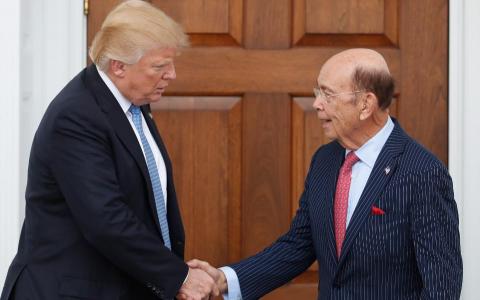
Paradise Papers hit the commerce secretary hardest, reopening old controversies he’d rather stay buried and under the the public radar. Right or wrong, some things just look bad.
It’s a bad week when getting your billionaire status revoked is one of the better outcomes of a massive dump of confidential documents, but that’s exactly what happened to Wilbur Ross.
Sure, Forbes went back and docked his estimated net worth by $2 billion, effectively accusing him of lying to the venerable wealth trackers for over a decade.
While that kind of revelation stings, the missing money pales to what the dump revealed about what Ross does have going on: the Cyprus connection to Moscow that seemed buried months ago is back in the spotlight.
And even though industry insiders can connect the dots in a non-damning way, the optics are pretty bad as far as the general public goes.
Making money in disaster zones
Ross spent his life working with distressed assets. That’s what brought him into Donald Trump’s circles in the first place and that’s what led him to invest heavily in areas of the global market where straight-arrow funds don’t dare to tread.
The darker the cloud, the deeper the discount and the more attractive the vultures find it. Few corners of the market in recent years have been more deeply distressed than deep sea shipping, especially when you’re looking at the tankers that move oil and liquified natural gas.
And when it comes to those particular commodities, Russia has become the biggest cloud of them all in the years since the oil market crashed.
After all, you’re dealing with a country under strict sanctions and serious constraints on foreign investment. For a vulture fund willing to take the risk, Russia was the holy grail — and direct access went over a cliff.
Put it all together, any firm like Wilbur’s would be eager to capture a slice of a shipping company with Russian customers, which is exactly what W.L. Ross & Company did.
Similar logic applies to the firm’s close involvement with the battered Bank of Cyprus. When the island’s economy caved in back in 2014, Ross was there to lead a $1 billion recapitalization on the cheap and then put the pieces back together.
It’s what vulture capitalists always do. The only yellow flags are that Cyprus is a noted Russian money laundering transit point and Ross eventually decided to go into government.
If he’d stayed at the fund, nobody would care where he invested, provided of course that he followed official no-go rules on people, companies and countries barred to U.S. money.
But when the U.S. commerce secretary cultivates business relationships with multiple entities closely linked to Russia, it sends the wrong signal — especially in an administration dogged with allegations that too many advisors are in bed with Vladimir Putin.
Ross did the right thing by quitting the Bank of Cyprus board, but the fund hasn’t divested. It would mean selling at a loss because the bank has yet to really recover.
Ditto the gas shipping company. Ross can’t unwind his stake there. It’s part of the fund portfolio — and he no longer controls the trades there.
After all, he sold the company years ago and stepped down from most management roles when he joined the administration. He couldn’t sell it without cashing out entirely.
Of course there’s nothing stopping him from doing that. That’s between him and the ethics watchdogs in Washington.
But to ask the fund to dump holdings simply to protect his political profile isn’t exactly fair to the current owners or the other shareholders.
Blurred personal and institutional footprints
What gets Ross into trouble is the way the line between the fund and his personal investments broke down.
Forbes says he deliberately counted the fund’s assets as his own in order to get a better score on the billionaires list.
Ironically that subterfuge imploded when he told them he divested $2 billion to his family in order to satisfy the standard for eliminating conflicts of interest.
While that move would’ve been ethically appropriate, pushing the button when it looked like an estate tax repeal was on the horizon amounted to gross financial malpractice.
It just didn’t add up. The money didn’t exist.
Even so, keeping his personal wealth so closely entwined with the fund’s holdings keeps getting him in trouble. A vulture capitalist will go to the dirtiest corners of the global market in search of a meal on the cheap. A cabinet secretary becomes a target.
After all, at this point I can’t say Ross is crooked or not. He might’ve simply chased a lot of dirty assets around the fringes of the Russian no-fly economic zone in pursuit of profit. There’s no crime there. It’s just smart business.
But going into government raises too many questions around that portfolio of assets. He knows what’s in the portfolio. He hasn’t divested.
Would he bend U.S. trade policy in order to boost the value of the fund’s holdings, whether that means softening Russian sanctions, throwing Cyprus a sweetheart deal or anything else?
All I know is that Cyprus is showing up a lot around the Mueller investigation. Paul Manafort ran a lot of Ukrainian money through the Bank of Cyprus and other institutions that are now cooperating with the prosecutors.
Ross was a big wheel at the Bank of Cyprus at the time. It’s probably a coincidence of the way vultures seek out the most rotten meat around, but it strains propriety.
He can sever his personal fortune from the fund’s holdings at any time. If he wants to be taken seriously, it’s really very simple. Otherwise, the questions will multiply.



